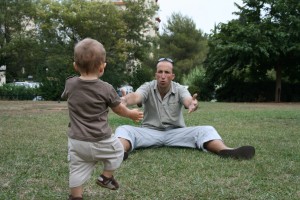“A father holds out his hands to a child who is learning to walk, and he comforts the child with words and draws it toward him, but he lets the child feel the risk it is taking, and lets it choose its own courage and the certainty of love and comfort when he reaches his father over—I was going to say choose it over safety, but there is no safety. And there is no choice, either because it is in the nature of the child to walk. As it is to want the attention and encouragement of the father. And the promise of comfort. Which it is in the nature of the father to give. I feel it would be presumptuous of me to describe the ways of God…when there is so much we don’t know. Though we are told to call Him Father.”
This excerpt is a letter from the remarkable old pastor John Ames, to his wife, Lila, in Marilynne Robinson’s new novel, Lila. The wife has gone through hardscrabble beginnings and is searching for an answer as to why things are the way they are. Why do things happen as they do? Over the course of the story, her husband reveals what he’s come to understand about existence and suffering.
 In the pastor’s kind letter, God is portrayed as a father who offers certain love. At the same time, the child has to take that step and feel the risk of taking it. The toddler has to choose its own courage, because there’s no safety in those first steps.
In the pastor’s kind letter, God is portrayed as a father who offers certain love. At the same time, the child has to take that step and feel the risk of taking it. The toddler has to choose its own courage, because there’s no safety in those first steps.
And so it is for us in choosing steps of faith.
Bill Glass, former NFL star, has worked in prison ministry for decades. He’s shared his life message—“The Healing Power of a Father’s Blessing”—in and out of penitentiaries all over the world. Years ago, I heard his basic talk on the subject. It’s in my top five.
He says a father’s blessing conveys love only if it includes the following…
–A declaration of love has to be said with spoken words. (No assumptions – “Oh, he knows I love him. I don’t have to say it.”)
–It has to be said with physical affection. (No ironing board hugs or inappropriate touching.)
–It has to be unconditional. (Not—“I’ll love you when you shape up.”)
–And it has to be forever. (“I’ll never stop loving you even if you become the worst version of yourself.”)
 Love and acceptance have to be given with words and touch, unconditionally and forever. This rings true.
Love and acceptance have to be given with words and touch, unconditionally and forever. This rings true.
Bill talks about the kind of father who actually thinks he’s helping his child by keeping the blessing slightly out of reach. “Well, you did really well on that test, but next time if you study a little harder, you can do better.” Like a carrot on a string, the blessing is in view, but never really given. The idea is that the child will excel in that kind of atmosphere and reach new heights. And some children do, because winning the father’s love is so paramount.
But any relationship based on fear and control is always damaging.
A counselor I met once stated that the most destructive family type involves parents who are authoritarian, emotionally distant, and set very high performance standards for their children. It’s especially toxic if it’s a “Christian” family.
 That surprised me. A love-out-of-reach family is more harmful than a physically abusive family, because the child is convinced that he is the problem. Something is wrong with him, if he doesn’t measure up. His inner turmoil can feel overwhelming.
That surprised me. A love-out-of-reach family is more harmful than a physically abusive family, because the child is convinced that he is the problem. Something is wrong with him, if he doesn’t measure up. His inner turmoil can feel overwhelming.
In physically abusive families the child has a sense—no matter how vague—that something is wrong with the parent.
So in John Ames’ description of a child’s first steps—the sureness of the father’s love makes all the difference.
One could argue that as a toddler grows in ability, the father might step back so the child will venture out further. That can’t be bad, can it? It’s a carrot-on-a-string game—the father’s arms slightly out of reach. Wouldn’t this help the child grow? Maybe.
But there is a vast difference in a single question: Overall, has love been withheld or given?
What’s in the father’s heart determines everything.
If you’ve never received your earthly father’s blessing, it’s very hard to believe Father God awaits you with open loving arms. And stepping forward is so much harder. But the Cross is our assurance that we are fully accepted by God.
We may always be uncertain in our steps. Faith is fraught with risk. But we can be certain of the One we are following.









